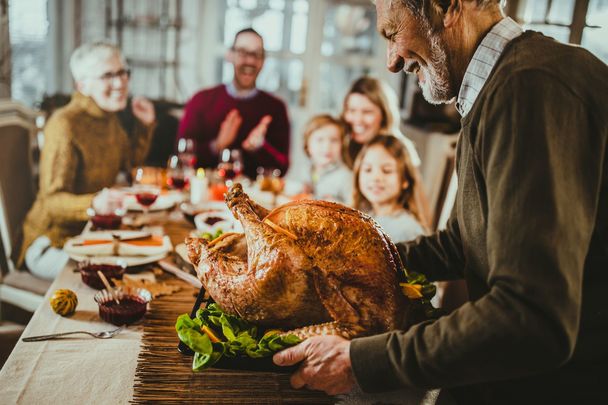While you sit down to eat your Thanksgiving dinner this holiday season. Spare a thought for the Irish-Americans who trod the path for the Irish to take their rightful place among the many and varied ethnic groups that make up the US of A.
Thanksgiving in the United States is a celebration of the American national origin myth. The plucky group of pilgrims fled religious persecution in Europe. Striving to breathe the free air of a new continent with new hope for the future. The first Thanksgiving was celebrated by the pilgrims to show their thanks to the Native Americans for helping the pilgrims through the harsh winter.
The real origins of Thanksgiving are more complicated, however.
Thanksgiving Turkey
Turkey, being native to the US, is a symbol of the bounteous riches of the nation. The stuffed turkey represents the American Indians, consumed in order to bring European civilization to the new world.
However, were the native Indians the only population that needed to be tamed in order for the American myth of "Manifest Destiny" to be realized?
What if I told you that the Irish population in the US was just as feared and hated by the original colonists? These colonists were descendants of the same socio-political class that had misruled Ireland for hundreds of years previously.
When the Irish landed in the US. They found the discrimination and bigotry from which they had left Ireland to escape had followed them to the new world.
So what does this mean for the Irish-American community?
America has always been a nation of immigrants. Consisting of waves of different ethnic groups. The problem, of course, was how could these ethnic groups, each with their own customs and beliefs, integrate into a new country and become American.
Simple. One of these transformative experiences was the consumption of a sacred meal on a secular holiday. Immigrants go from being the "other" to becoming American citizens. Taking part in an American ritual and transforming themselves symbolically from foreigners to Americans.
As the Irish worked their way up the social ladder. From pauper to cop, cop to politician, and politician to the American president. They did this by taking part in a number of American rituals.
Everything from being good citizens, voting in elections, mobilizing politically, serving in the army, and finally partaking in American ritual meals such as Thanksgiving.
Irish to Irish-Americans
The passage from being considered Irish to being American was a difficult one for the Irish population in the US.
Not only were the Irish victims of hundreds of years of oppression by the British empire but other differences such as language, culture, and customs separated the early Irish immigrants.
The Protestant and Ulster Scots settlers in the US distrusted and despised the Catholic Irish immigrants who were vilified at every turn. Wild theories flew around that the Pope was planning on invading the US and establishing a new Vatican in Cincinnati.

Love Irish history? Share your favorite stories with other history buffs in the IrishCentral History Facebook group.
Anti-Irish feelings ran so deep in the US that Abraham Lincoln commented that the US was in danger of having to amend the constitution to include "all men are created equal, except negroes and foreigners and Catholics."
Since the Irish were among the first Catholic populations to settle in large numbers in the US they bore the brunt of the anti-Catholic feeling in the country.
There is some evidence that the first Thanksgiving in the New World was provided by a food bounty from a ship that sailed from Dublin to the colony. The more concrete results of the Irish contributing to American life can be seen in the menial jobs to which the Irish were assigned.
Often Irish-American men worked in the mines and canals. Many worked on the railroads - a job so dangerous that it was remarked at the time that "[there was] an Irishman buried under every tie."
At the end of the day, Irish Americans and their descendants made incalculable contributions to almost every area of American life, including politics, industry, organized labor, religion, literature, music, and art.
*Dara Burke is a local storyteller and True. Cork. Rebel. When he's not helping guests experience the real 'Rebel City' on his Rebel City Tour of Cork, featuring local food, local drink, and exciting Rebel tales, he's creating guides of things to do in Cork. Join him on his exciting Cork walking tour to immerse yourself in real Cork culture and make the most of your time in the city.
** This article was originally published in 2018, updated in Nov 2024.




Comments